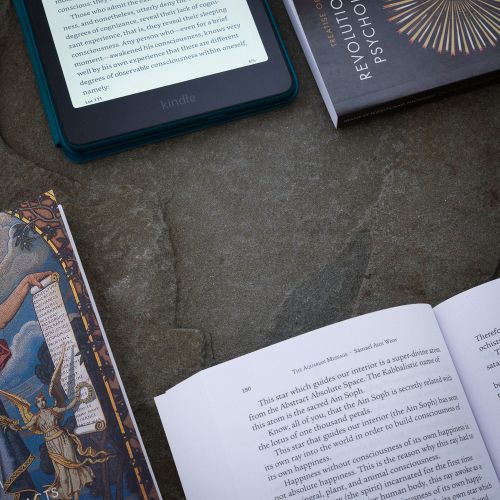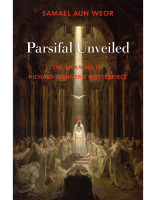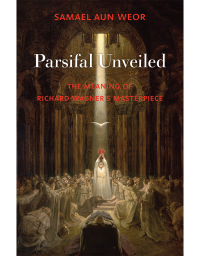It is a terrible moment when the erotic weapons of the overwhelming passionate love—the very special patrimony of Kundry, the superior woman, the most enchanted and pernicious of all creatures in their eternal victory—must enter into activity. The rugged vesture of that penitent one from the sullen land, of that loyal messenger of the Holy Grail, has disappeared. Kundry, Herodias, Gundryggia, is now the nubile feminine beauty with all the marvelous power of her irresistible, magical fascination.
Amidst the delectable penumbra of the garden, it is understood that the bewitched conjuration from the evil magician has frightfully enveloped her within his fatal sortilege. The enslaving discharge from the abysmal desideratum is frankly already unavoidable. Thus, as it is natural, the miserable beauty suffers within the unknowable profundities of her intimate consciousness.
The very beautiful and frightful scene of sexual temptation has started amidst the fascinating mirrors of life…
Only God knows what happens within the psychic depths of that provocative woman. It is unquestionable that within that adorable female there is a battle of woman against woman, of temptress against redeeming one, of love against cruel perfidy that poisons everything. It is obvious that within the miraculous soul of that beauty, the two Kundrys struggle hand to hand. It is clear that in the depth of mystery this fascinating, sweet creature becomes just another victim of the perverted natural impulses. Enslaved by the sexual passion of the enjoyment that man’s attraction exercises over her, constrained by the magical potency of the conjuration, she then inclines to her feminine ingenuity in order to subdue the young man to temptation.
When entering into this part of the Wagnerian drama, it is important to remember that the Persians saw in the woman the aspect of illusion, the element of absolute seduction. Regarding the nature of this Persian ideology, what is clear are those allegories and adopted stories from the Koran, especially the one of Joseph and Potiphar where the aspect of the woman is shown as a universal danger. Thus, Firdawsi transforms Potiphar’s wife into Luleica, who with her physical enchantments not only induces Joseph into temptation, but, rather, her intention was to apprehend the virtuous one through magical manners in the hallucinating snare of her lasciviousness. Thus, she received Joseph in a hall of mirrors. Her red hair, her damned, purple red lips, the rosy nipples of her erect nacreous breasts, her whole body anointed and undulant, dazzled him, here, there and everywhere he directed his sight. Accordingly, with this interpretation of the Persian story, the Patriarch Joseph could not resist, and he succumbed to her craftiness.
In this marvelous representation of the magical mirrors is found hidden the whole mystery of sexual fascination.
Nature inclined to passionate voluptuousness is without any doubt a unique seduction, and works upon all living creatures in a hypnotic way.
The tridimensional world of vain appearances imprison us horribly in this way, since we invariably succumb to the enchantment of our sexual antipode.
Kundry, Herodias, Gundryggia, the mystical Magdalene from the Wagnerian Parsifal, does not ignore the living secret of her existence. She knows very well by her own nature and instinct that she can only be liberated from the left-hand and tenebrous power of Klingsor if she finds on her path of bitterness a strong man capable of defeating himself and thus rejecting her.
“Weak, all men…! I am accursed, and I bring all of them to their downfall…!” exclaims the temptress.
Temptation is fire; the triumph over temptation is light. Blessed be the woman, blessed be love, blessed be the beings who adore each other.
It is indubitable that the ancient religious cults in Greece, Chaldaea, Egypt, Persia, India, Mexico, Peru, etc., were one hundred percent of a sexual nature.
Without any doubt, the acknowledgment of the sexual potency as a supra-terrestrial, engendering, and creative force is fundamentally more self-ennobling and dignifying than the medieval attitude that relegates sex to considering it something low, sinful, filthy and an enemy of the soul.
In the sexual cult of ancient Greeks, the mortal couple aspired with all the forces of their soul to reflect in themselves the joy of the divine couple.
It is stated by the legend of the centuries that the celebration of sacred nuptials were in practice in Greece and equally so in Rome.
After a ceremony in the temple, the man and the woman (Adam and Eve) anointed, preciously arrayed, and crowned with sublime flowers, directed themselves to their mutual encounter as god and goddess in order to be participants of the ritual embrace, which is that happiness of the supreme couple who reign in heaven and earth. Each man represented Zeus and each woman Hera in the sexual amorous act, thus performing a magnificent connection of the lingam-yoni.
It is clear that the joyful couple withdrew from the sexual act without spilling Hermes’ cup.
Thus, at that time sexuality was the likeness of a formidable cosmic event that made the whole universe shake.
This is something that we must never forget; such a sublime identification with the Divine can only be acquired by couples who are truly awakened, individualized, illuminated.
Sacred experience, alchemical weddings, ritual embrace, joy without limits for the sacred couple, can only be accessed by adepts of the White Fraternity.
The great Greek poet Homer has verified a sublime and magical description of the divine couple Zeus-Hera:
“Beneath them, the germinating earth burst with fresh green grass, lotuses, succulent clover, hyacinths and saffron, so thick and soft it lifted their bodies off the hard packed ground… and there they laid down together and drew about them a golden marvelous cloud, and the sparkling dew fell upon the ground.”







